
(Matthew 16:13-23)
May these words of this Peter be like a rock,
not a stumbling block!
|
|
"Who do you say
that I am?" Jesus asked. Simon Peter answered, "You
are the Messiah, the Son of the living God." And Jesus
answered, "Blessed are you, Simon son of Jonah! ... You are
Peter (petros), and on this rock (petra)
I will build my church..." Jesus then began to speak of
the rough road ahead. And Peter took him aside and rebuked him... "Get
behind me, Satan!" Jesus replied. "You are a stumbling
block..." (Matthew 16:13-23) May these words of this Peter be like a rock, |
"A Lonely Place ... a Crowded Shore"
Message preached July 15, 2012
Long Green Valley Church of the Brethren
Glen Arm, Maryland USA
based upon Mark
6:30-46
If someone
accuses you of being unbalanced, itís not likely theyíre paying you a
compliment. Balance is something
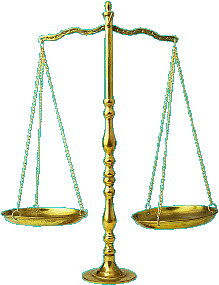 most of us prize. To lose our balance is
embarrassing. To get out of balance is to risk being seen as unstable. And thatís
a terrible word to have appear on your recommendation for college or a job.
most of us prize. To lose our balance is
embarrassing. To get out of balance is to risk being seen as unstable. And thatís
a terrible word to have appear on your recommendation for college or a job.
Balance. An engine thatís out of balance can cause some serious problems. Balance. Itís the secret of healthy eating. Balance. In business there needs to be a proper balance between your receipts and your expenditures. Balance. A diplomat must walk a fine line between the needs of two or more countries. An unbalanced walk leads to war.
Balance is something most of us consider valuable. Indeed, it is also important for us to become balanced spiritually. As is true in maintaining an automobile, or taking care of a body, or in keeping up a budget, or building peaceful relations between nations - it is important for our life in Christ that we seek a sense of balance.
In the
beginning, God created all things. And then this creator, this builder, this
worker of workers ... rested. A pattern was established with which those who are
created in the Creatorís image might balance their lives. A commandment was
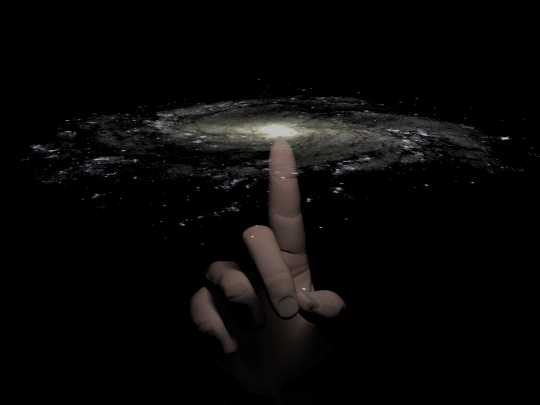 given: "Remember the Sabbath, the day of rest, and keep it holy."
Allow your God, who worked and rested in creating the world in which we live, to
restore in you a sense of balance.
given: "Remember the Sabbath, the day of rest, and keep it holy."
Allow your God, who worked and rested in creating the world in which we live, to
restore in you a sense of balance.
Balance. In a world slightly off kilter, or at least so it often seems, we need Godís balancing. Itís not so much a matter of making sure that for every week of work there is a day of play. Donít get me wrong, play is important. But in order to become balanced spiritually, God needs to be a part of our recreation. Otherwise, our recreation will not be re-creating. It will not really add a sense of balance. And balance is something most of us prize. To lose our balance is embarrassing. It can also be fatal, especially if you walk a tightrope.
Jesus knew this full well. You could say he walked the most dangerous tightrope in the world. The man who went ahead of him, crying out "Prepare the way of the Lord!" - this baptizer named John, whom the authorities branded a lunatic, this man who stepped out on Godís tightrope, fell off. It was a dangerous path. The powers that be played with the rope and John lost his head. Literally. Jesus was fully aware of the danger. But he was more aware of his need for Godís balance as he walked.
In this
morningís Gospel lesson which, by the way, follows the story of John the
Baptist being beheaded by King Herod, and his head then being delivered on a
platter as part of a gluttonous meal in the palace (a dangerous tightrope,
yes?); In this morningís Gospel lesson we see Jesus encouraging his disciples
to "Come away by yourselves to a lonely place and
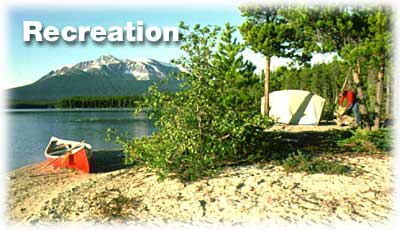 rest a while."
rest a while."
Previously, he had sent them out two by two, to spread Godís good news from town to town. He sent them out to work. When they returned from their labor, he encouraged them to rest. Of course he didnít say, "hook up the camper and head up to the lake for a fishing weekend." But he was sending them off to rest, for they had been busy, not even having a momentís leisure. And they did respond by piling into the boat for a trip on the lake.
But there was more to this outing than recreation. Jesus knew the value of Godís balance in an out-of-balance world. His encouragement to "Come away by yourselves," was more than a "take five." I like how the King James version says it: "Come yourselves a part into a desert place and rest a while." Literally, Jesus encouraged his disciples (then and now) to head out into a wasteland, an abandoned place, a wilderness, a desert, and there find rest.
Say what? When was
the last time you headed for the landfill to rest? Thatís not where spent my
vacation this past month. When you head out for a weekend of recreation,
 do
you park yourself in the middle of a desert? Granted, there are campgrounds, as
well as motels that could properly be described as dumps. I can think of one in
particular at which my family once stayed outside Memphis, Tennessee. But I
didnít particularly feel rested after staying there. Perhaps youíve had a
similar experience at a campground or motel.
do
you park yourself in the middle of a desert? Granted, there are campgrounds, as
well as motels that could properly be described as dumps. I can think of one in
particular at which my family once stayed outside Memphis, Tennessee. But I
didnít particularly feel rested after staying there. Perhaps youíve had a
similar experience at a campground or motel.
Anyway, Jesus encouraged his disciples to find a desert place where they might be renewed away from the pressures of the tightrope. Jesus was pushing them, really, into the hands of God. In the hands of this Creator, they could experience the re-creating power of God. There is real value in coming "aside to a desert place."
Among the
early Christians were those who saw in these words a call to live in the desert,
literally, and there - amid the barren-ness, the nothing-ness - to discover the
re-creating power of God. They were known, appropriately, as the "desert
fathers." From these roots sprang up a whole tradition of monks and nuns
and monasteries. In fact, the words "hermit" and "hermitage"
are derived from the Greek word that Jesus used to describe a lonely place, a
desert, a wilderness, a barren
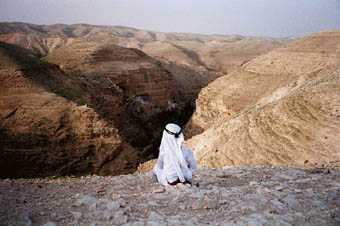 place.
place.
"Come away by youselves," Jesus said, "to a lonely place and rest a while." Now, I donít sense in these words a call for all of us to run out today and join the nearest monastic order and become nuns or monks. But, we need to hear the clear call of Christ to balance our lives by coming aside and finding rest, not just in a weekend of recreation, but in the re-creating power of God. All too often, the tensions of daily work, the noise and clatter of everyday living, blind us from and deafen us to the balancing power God gives us for walking our tightropes.
"Come away by youselves," Jesus said, "to a lonely place and rest a while." Sometimes it takes a desert for us to see or hear God working in us. It was true for the disciples. Is it any less true for us? Sunday, our Sabbath in Christ, the day of rest for believers, can be a desert time, a time for seeing and hearing God at work in us with re-creating power. Now, you may feel Sunday morning is sometimes a real desert experience - that is: dead, lifeless, boring, dull. And there is some real truth in that. Worship can be dull and boring, and we ought to liven it up to express outwardly the wonder of God at work within us.
Even so, the next time you find yourself feeling worship becoming a real wasteland for you, maybe it can be an opportunity for you to grow in Christ. What is God saying to you amid the seeming barren-ness of it? Can you open yourself in this desert to Godís re-creating power? Instead of dwelling in your boredom perhaps you can learn in the middle of it to listen more carefully for God. We have become so used to vivid messages coming at us from our televisionsa nd computer or Ipod screens, that we grow more and more incapable of discovering the subtle ways God speaks in this world. We want God to stand up and speak loudly and clearly, cause thatís what weíve grown used to. But if God were speaking in this way, would we really like it?
Think about the power we saw in all those tornados in the midwest, or the fires in Colorado - events insurance companies classify as "acts of God." If the Lord were to speak in the way in which weíve grown accustomed, the earth would tremble, the seas would roar, the mountains would topple. Sounds like biblical stuff, doesnít it? But God definitely does speak in less obvious ways. Only we have become so out of balance that we need some desert time to become balanced again. Worship can be such a desert time, an opportunity, if weíre ready for it.
The problem, as always, is this - will we allow it to happen? "Come away by youselves," Jesus said, "to a lonely place and rest a while." What happened next for the disciples? They hopped in the boat to get away with Jesus, alone. Unfortunately, lonely places were not in abundant supply. The crowds, hungry for God, or just plain hungry for something, followed. The lonely time had to be postponed for a later date. Jesus saw the great need and made the most of the opportunity to teach the people.
After a full day of such teaching the disciples, still unrested from their long journey, took Jesus aside for a moment. "Lord, yes, this is a lonely place, for sure. But it is getting late (yawn). Why not send these folks away so that they can go home and get some food and rest, (which is what we need, also)?" No doubt, in the back of their minds the disciples heard again the encouragement of Jesus to get away from the crowds and receive some needed rest. If they were anything like me, they probably were not paying much attention to what Jesus was saying. "Come on, Lord, letís get this over with and get out of here." Perhaps they were bored out of their gourd.
However,
they did speak a real truth, whether they realized it or not. That place was
a real waste-land. There, in that deserted spot, Jesus prayed a blessing and
broke a meager bit of bread, divided up a few fish, and fed a huge crowd. That 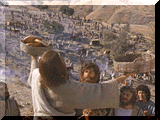 lonely, barren spot by the shore became a place where the re-creating power of
God happened. You know what? If it can happen there, then maybe, just maybe, it
can happen here. No, not the obvious miracle of loaves and fishes multiplying to
feed thousands, but the miracle of discovering God at work in us even in a
wasteland. Thatís the real miracle.
lonely, barren spot by the shore became a place where the re-creating power of
God happened. You know what? If it can happen there, then maybe, just maybe, it
can happen here. No, not the obvious miracle of loaves and fishes multiplying to
feed thousands, but the miracle of discovering God at work in us even in a
wasteland. Thatís the real miracle.
Compared to the re-creating power of God in Christ on that hillside, the loaves and fishes were just ... loaves and fishes. Unfortunately, the crowds saw only the food in their hands. They didn't see themselves as being in God's hands. Jesus walked a tightrope. Between the people who only were interested in miracles and not in the God behind them, and the folks who felt threatened by the re-creating power of God, Jesus walked the tightrope that led him to the cross where eternity stood in "balance."
The way of
salvation for humanity lay upon a barren hill called Golgatha, where Jesus
intentionally jumped off the tightrope and restored God ís balance to an
unbalanced world. That wilderness has become for us a place where flowers bloom
in the desert. A barren cross became the tree of life. Thatís the re-creating
power of God. A lonely place becomes a place of rest because, in Godís
reality, it is never a lonely place. The creator, the re-creator, is there with
us.
ís balance to an
unbalanced world. That wilderness has become for us a place where flowers bloom
in the desert. A barren cross became the tree of life. Thatís the re-creating
power of God. A lonely place becomes a place of rest because, in Godís
reality, it is never a lonely place. The creator, the re-creator, is there with
us.
If we do wish to take Sunday with us when we crossover to Monday morning, we need to see the Sabbath for what it truly is. "Come away by youselves," Jesus said, "to a lonely place and rest a while." There is a powerful need in us to rest, a need that cannot be fulfilled by what we normally refer to as recreation. Godís rest is a balancing power. Our world all-too-quickly and easily moves off kilter. Regularly, we need to come aside to a lonely place to rest in the Lord, so that our lives might become balanced again.
Itís not that we cease to have struggles. In some ways, we all walk a tightrope. But without the re-creative balancing power of God, we can easily fall off. We need Godís balance. Gathering together on the Sabbath helps put our focus back into Godís perspective. Gathering together every week encourages us, each one of us, to grow in our personal times of "coming aside to a lonely place," and daily seeking Godís balance. When we seek Godís re-creative balancing power, when we "come aside to a lonely place and rest a while," we can become, right where we are, what the Lord of Life has created us to be. And, rooted in God, we can help bring balance to our out-of-balance world.
| online resources for this scripture text |
For commentaries consulted, see Mark. |
©2012, 2003, 1989 Peter
L. Haynes
(you are welcome to borrow and, where / as appropriate, note
the source - myself or those from whom I have knowingly borrowed.)